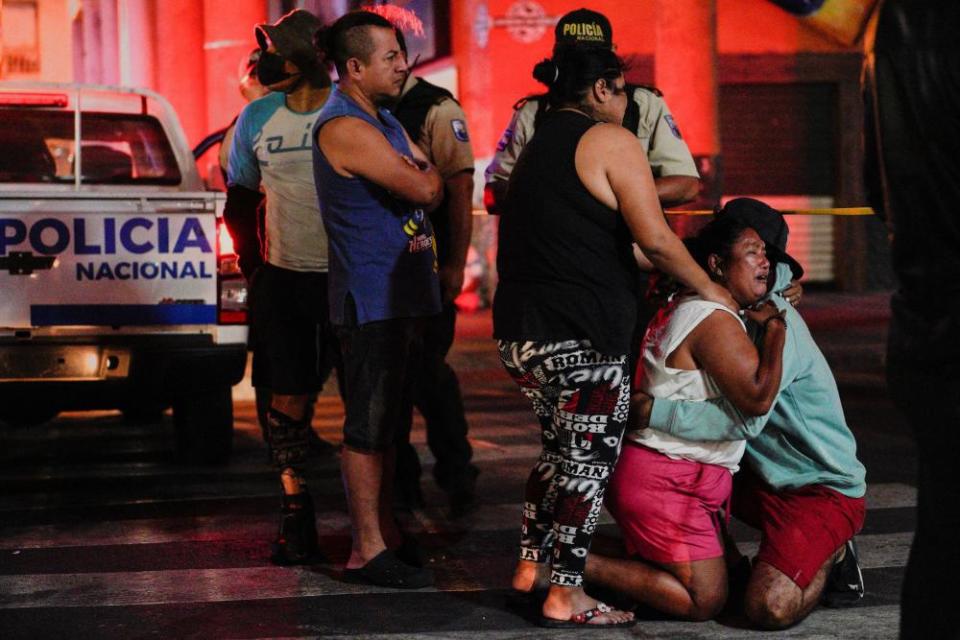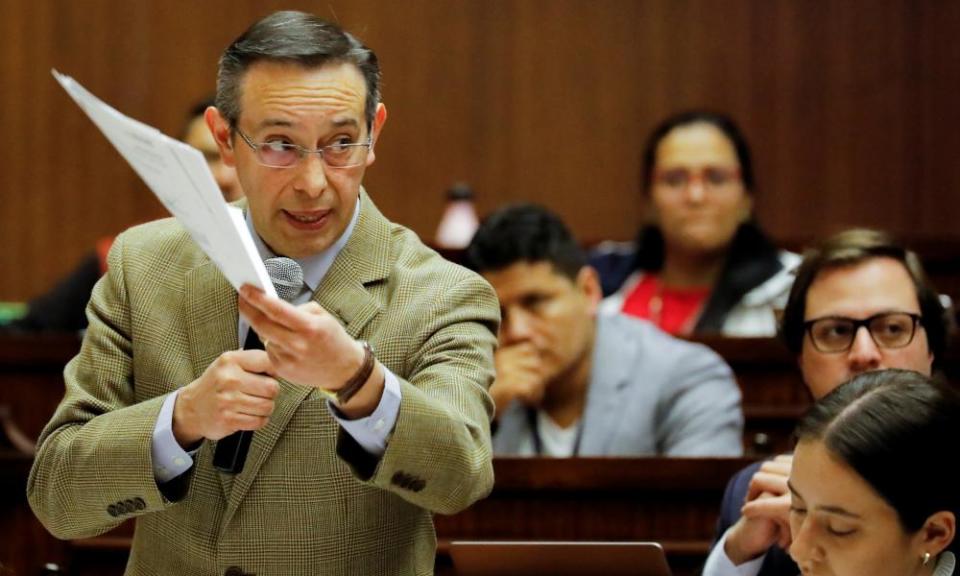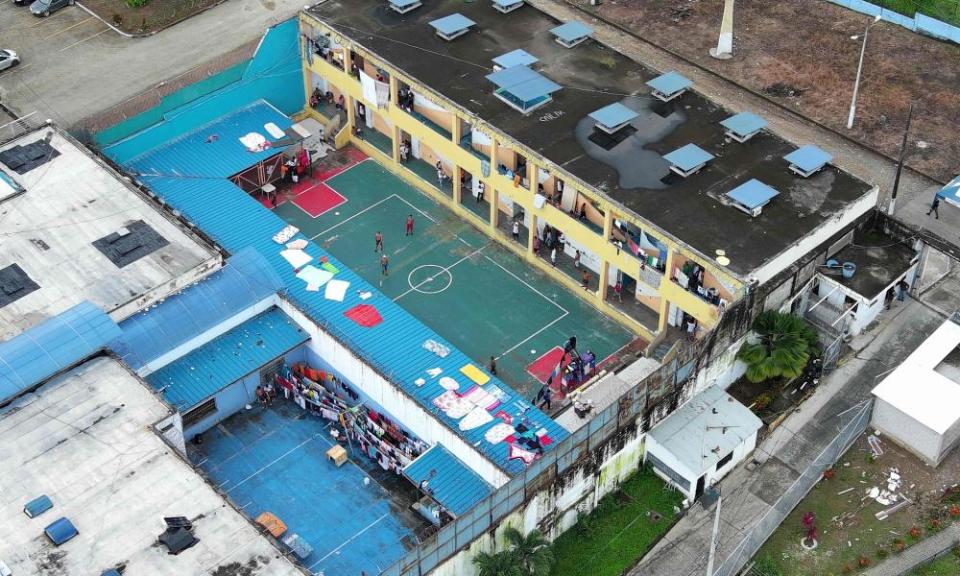Ecuador’s criminal gangs bring death and mayhem amid political gridlock
- Oops!Something went wrong.Please try again later.
The attack came from the sea: more than two dozen masked gunmen were on the speedboat which roared in from the Pacific Ocean towards a fishing port in the Ecuadorian coastal city of Esmeraldas.
Related: Ecuadorian TV presenter wounded by bomb disguised as USB stick
Fishermen and dock workers ran for their lives – some diving into the water – as the assailants sprayed the quay with about 200 bullets. Nine people aged between 28 and 79 were killed in the 11 April massacre.
In the days that followed, six prisoners were found hanged in a prison cell in Guayaquil, then 12 more were slaughtered in the same jail – the notorious El Litoral – and three female prison guards were shot dead on the street outside.
It was just the latest in a brutal wave of violence unleashed on Ecuador’s people, driven by organised crime gangs vying for territorial control of lucrative cocaine-smuggling routes.
“We do not deny that we are in the worst moment of violence in the country,” said Ecuador’s defence minister, Juan Zapata, after the string of attacks exemplified just how routine gang violence has become in the small Andean nation.
“A process of urban terrorism has been unleashed,” Col Mario Pazmiño, a former director of military intelligence, told the Guardian. “The government has lost control of this crisis.”
As the violence rages, Ecuador’s political system is paralysed by infighting. In the face of a looming impeachment by a hostile congress, President Guillermo Lasso has pledged to dissolve the chamber and call early elections.
The unpopular conservative, 67, has battled repeated attempts to remove him from office by the majority political opposition in congress. They accuse him of failing to stop alleged corruption in the state-run oil shipping business – and allegation which he denies.
“Ecuador’s biggest problem is that the political elite is engrossed in their conflicts and petty interests,” said Felipe Burbano, a political scientist who heads the Latin American Faculty of Social Sciences in Quito. “The problem of violence is magnified by the weakness of the state and the government.”
On Tuesday, police briefly detained Lasso’s brother-in-law, Danilo Carrera, before he boarded a flight to New York over a separate case of alleged influence-peddling. Carrera denies the allegations.
Ecuadorians appear to be divided. One poll in March showed 38.7% believe Lasso, who was elected in 2021, should complete his four-year term. Another 28.3% said Lasso should invoke a constitutional clause known as muerte cruzada, or mutual death, to force early elections for congress and his own job; while 14.5% polled that Lasso should step down, a move he has ruled out.
Burbano said the “least bad option” would be for Lasso to finish his mandate after two years of political instability which, he believes, has worsened the violence.

“The illusion is that a presidential changeover can be a way out. I believe the opposite is true,” he said, comparing Ecuador’s situation to that of neighbouring Peru which has had seven presidents in six years. “The [prospect of] presidential changeover is deepening the crisis. Ecuador has to build a political horizon, whoever is in power.”
Meanwhile, the Lasso government wants criminal gangs to be classified as terrorists to allow the armed forces to be deployed against the unprecedented tide of drug gang killings.
But while car bombs rip open neighbourhoods and drug-related killings surge in the Pacific-facing Guayas and Esmeraldas regions, the morale of Ecuadorians is running low when they see the political elite in the capital, Quito, bicker and plot against each other.
More than 400 prison inmates have been killed – many burned alive or beheaded –since February 2021 and the country’s murder rate nearly doubled last year as Mexican and Albanian cartels fight for cocaine trafficking routes to the US and Europe.
Until recently, Ecuador had largely escaped the drug wars and political violence which have racked its neighbours Peru and Colombia, the world’s top producers of cocaine.

Now, however, local criminal gangs are being schooled by former Colombian guerrillas and managed by the Mexican Sinaloa and Jalisco New Generation cartels, said Fernando García, a consultant with Security Expertise International, a firm that gives security training to companies in Ecuador’s port cities of Guayaquil and Manta.
“It’s an extremely dangerous formula with a great capacity to finance and execute criminal acts and to move at all levels,” he said.
Garcíasays he has himself received death threats since appearing on national television earlier this month.
“We started getting messages to take care of ourselves, take care of our families, that they already know who we are,” he told the Guardian. He claims sophisticated criminal mafias have penetrated the government and state institutions, as well as the police and armed forces. “The criminal gangs have many links at different levels of the Ecuadorian state.

“We are very exposed. We don’t want our families to be the latest to be affected [by the violence].”
Back-to-back states of emergency have failed to control the bloodletting, and with the police and judiciary infiltrated by corruption, President Lasso says he is counting on the military and special anti-terrorism powers – which have yet to be granted – to crack down on the drug gangs.
But Lasso must first survive his political trial before he can fight the narco-fuelled crime wave which, according to Burbano, has thrived on the “weakness of the state institutions, political order and government”.

